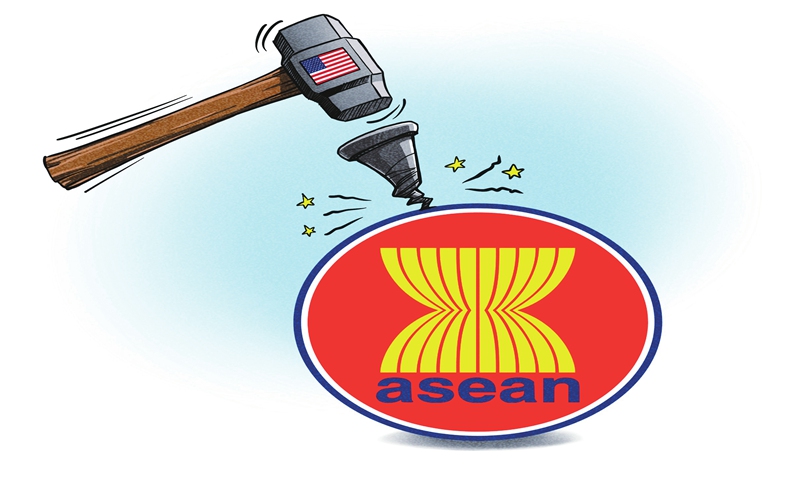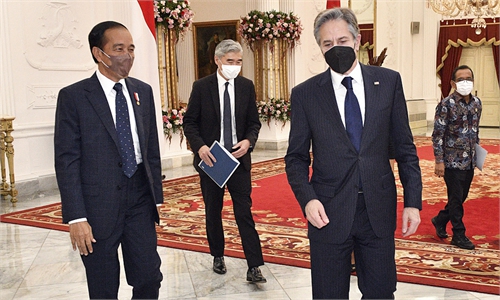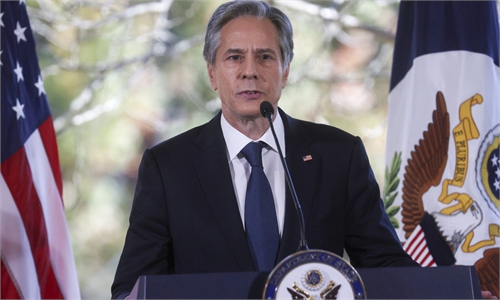Attempt to insert wedge in ASEAN unlikely to work as US wishes: Malaysian scholar

Illustration: Liu Rui/Global Times
Editor's Note:US Secretary of State Antony Blinken kicked off his visit to Indonesia, Malaysia and Thailand this week. This is another visit by top US official to Southeast Asia after US Deputy Secretary of State Wendy Sherman, Secretary of Defense Lloyd Austin, and US Vice-President Kamala Harris. In the Biden administration's Indo-Pacific Strategy, what is ASEAN's position? What are ASEAN's united tactics to handle relations with China and the US? Koh King Kee (Koh), President of the Centre for New Inclusive Asia in Malaysia, expressed his views to Global Times (GT) reporter Lu Yuanzhi.
GT: Before the visit, Blinken attended the G7 Foreign and Development Ministers' Meeting, to which ASEAN was invited as a guest. In the months prior, US Deputy Secretary of State Wendy Sherman, Secretary of Defense Lloyd Austin and US Vice-President Kamala Harris visited Southeast Asia. What's your take on Washington's frequent visits to the region? What is the purpose? To what extent is it to serve its intent to counter China?
Koh: One just has to take a look at the "US Strategic Framework for Indo-Pacific," which is the policy guide for the US to counter China in the Indo-Pacific, to understand the strategic importance of ASEAN to the US.
The critical US national security document, declassified by former US president Donald Trump even though the general custom is reportedly to wait 30 years before declassification, emphasized that the "Indo-Pacific will remain an engine of US regional and global growth," and [that] "lose in US preeminence in Indo-Pacific will weaken its ability to achieve US interest globally."
The Biden administration has inherited and adopted Trump's Indo-Pacific policy in totality. The purpose of recent successive visits by the top officials of the Biden administration is obvious, that is, to implement the action plans of the strategic framework to counter China's growing influence in the region.
GT: Ahead of Blinken's visit, Daniel Kritenbrink, the assistant secretary of state for East Asian and Pacific affairs said, "President Biden is committed to elevating US-ASEAN engagement to unprecedented levels" and Blinken's trip would focus on strengthening regional security infrastructure in response to Chinese "bullying" in the South China Sea. In Biden administration's Indo-Pacific Strategy, what is ASEAN's position? What do "unprecedented levels" mean?
Koh: One of the objectives of the Strategic Framework is to "promote and reinforce Southeast Asia and ASEAN's central role in the region's security architecture and encourage it to speak with one voice on key issues." In particular the US would "deepen the relationship with Malaysia, Indonesia, Vietnam, and Singapore."
Obviously, the Biden administration is trying to encourage the ASEAN countries "to speak with one voice" in response to China's "bullying."
In the virtual 2021 ASEAN Summit in October, US President Joe Biden announced an investment worth up to $102 million to expand the US' partnership with the group and US "will explore with partners the development of an Indo-Pacific economic framework" that will define "our shared objectives around trade facilitation, standards for the digital economy and technology, supply chain resiliency, decarbonization and clean energy, infrastructure, worker standards, and other areas of shared interest."
Maintaining centrality vis-à-vis US-China rivalry is the consensus of ASEAN member countries. In view of the geographical proximity and close China-ASEAN trade ties, it is unlikely that ASEAN will change their position on China.
GT: Former president Trump did not attach importance to Southeast Asian countries. But Biden is paying much more attention than Trump. What is the effect? What benefit has the US received?
Koh: Trump attended the ASEAN Summit only once in 2017 during his entire term of office. However, Biden attended the ASEAN Summit in October, less than a year after he assumed office. He promised to show up and reach out to ASEAN to deepen US cooperation with the group, reflecting Washington's change of attitude toward ASEAN.
ASEAN of course will welcome America's change of attitude toward the group, in keeping with its centrality position against the two big powers. Some of the Southeast Asian countries which are parties to the South China Sea dispute probably may hope that closer US engagement with the group could help them in their bargaining with China.
The US is fully aware that the Asia-Pacific region is the center of gravity for future world economic development, and US leadership in the Asia-Pacific region is the key to its maintaining global hegemony. The Biden administration expects closer cooperation with ASEAN could help to push back China's huge in the region.
GT: The "Summit for Democracy" hosed by the US leadership did not invite ASEAN members such as Singapore, Brunei, and Thailand, but did invite others like the Philippines, Indonesia, and Malaysia. Some analysis said Washington is sending different signals to ASEAN members, in a bid to test whether the bloc is united. How do you see such a view?
Koh: In fact, inviting three out of the 10 members states of ASEAN to attend the "Summit for Democracy" is not necessarily a smart decision by US. Excluding Singapore from the invitee list shows that the summit is more to serve America's geopolitical interest rather than to strengthen democracy as Joe Biden claimed.
America may be trying to insert a wedge among ASEAN countries. However, this is unlikely to work in the way US hopes and affect ASEAN member states' centrality stand on US-China rivalry.
It is interesting to note that though three ASEAN countries, namely, the Philippines, Malaysia, and Indonesia were invited to the "Summit for Democracy," only Philippine President Rodrigo Duterte spoke at the summit. Malaysia and Indonesia leaders did not show up at the event, an indication that the "Summit for Democracy" has little impact on ASEAN unity.
GT: China has always emphasized ASEAN solidarity, while the US is looking for opportunities to weaken and split ASEAN, hoping to find an anti-China ally in the region. How do Southeast Asian countries evaluate the situation? Will intensive visits and wooing by the US make ASEAN or individual member states change their current stance toward China?
Koh: Biden administration's intensive visits and engagements with ASEAN countries are unlikely to produce an immediate impact on ASEAN or individual member state's stance toward China. However, China should not take for granted its relationship with ASEAN members.
The long-term effects of closer cooperation and engagements by the US with ASEAN should not be overlooked. The US could be lobbying some Southeast Asian countries to join the Quad on a "Quad Plus" arrangement, that is, as Quad dialogue partners as a push back on China.
The South China Sea dispute has negatively affected the public perception of ASEAN countries on China. It is important for China to resolve the South China Sea dispute with the claimant countries.
GT: Some analysis said Southeast Asia has become a strategic battleground between the US and China. What the take of Southeast Asian countries toward such a view? Does ASEAN have united tactics to deal with relations with China and the US? If there are, what are the tactics?
Koh: The Asia-Pacific region is the center of gravity of economic growth of the world and America's leadership in the region is key to maintaining its global hegemony.
With America's shift of its global strategic focus to the Asia-Pacific region, ASEAN has become the key battlefield of US-China geopolitical competition.
ASEAN is fully cognizant of its strategic position in the global system. In general, centrality is the common stand of ASEAN countries toward China and the US.
However, there are different degrees of political trust among the ASEAN countries toward China. Cambodia, Laos and Thailand appear to have relatively closer ties with China compared with other ASEAN member states. Malaysia and Indonesia's relationships with China are stable but the US may play up the Xinjiang issue to agitate public perceptions of China in these two Muslim countries while the Philippines' relationship with China may swing with the personal attitude of its leader.


